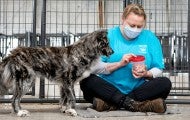About our volunteers Animal rescue volunteers (ARVs) work with our Animal Rescue Team to help save animals who are victims of illegal animal cruelty and disasters. When we respond—whether to a hurricane, large-scale neglect case, dogfighting or commercial breeding operation—animal rescue volunteers...
Soring involves the intentional infliction of pain to a horse's legs or hooves in order to force the horse to perform an artificial, exaggerated gait. Caustic chemicals—blistering agents like mustard oil, diesel fuel and kerosene—are applied to the horse's limbs, causing extreme pain and suffering...
Leaving pets locked in cars is never safe. But when the weather gets warmer, it can be deadly. High temperatures can cause irreparable organ damage and even death. Protecting animals from an unnecessary death is a problem we can all agree to prevent. How to help a dog or cat left in a hot car Take...
Extreme weather events like wildfires can kill wild animals, either from the fire itself, through smoke inhalation or through loss of habitat. Animals who are very young, old or otherwise unable to move away quickly are particularly vulnerable. Wild animals cope with wildfires in a variety of ways...






